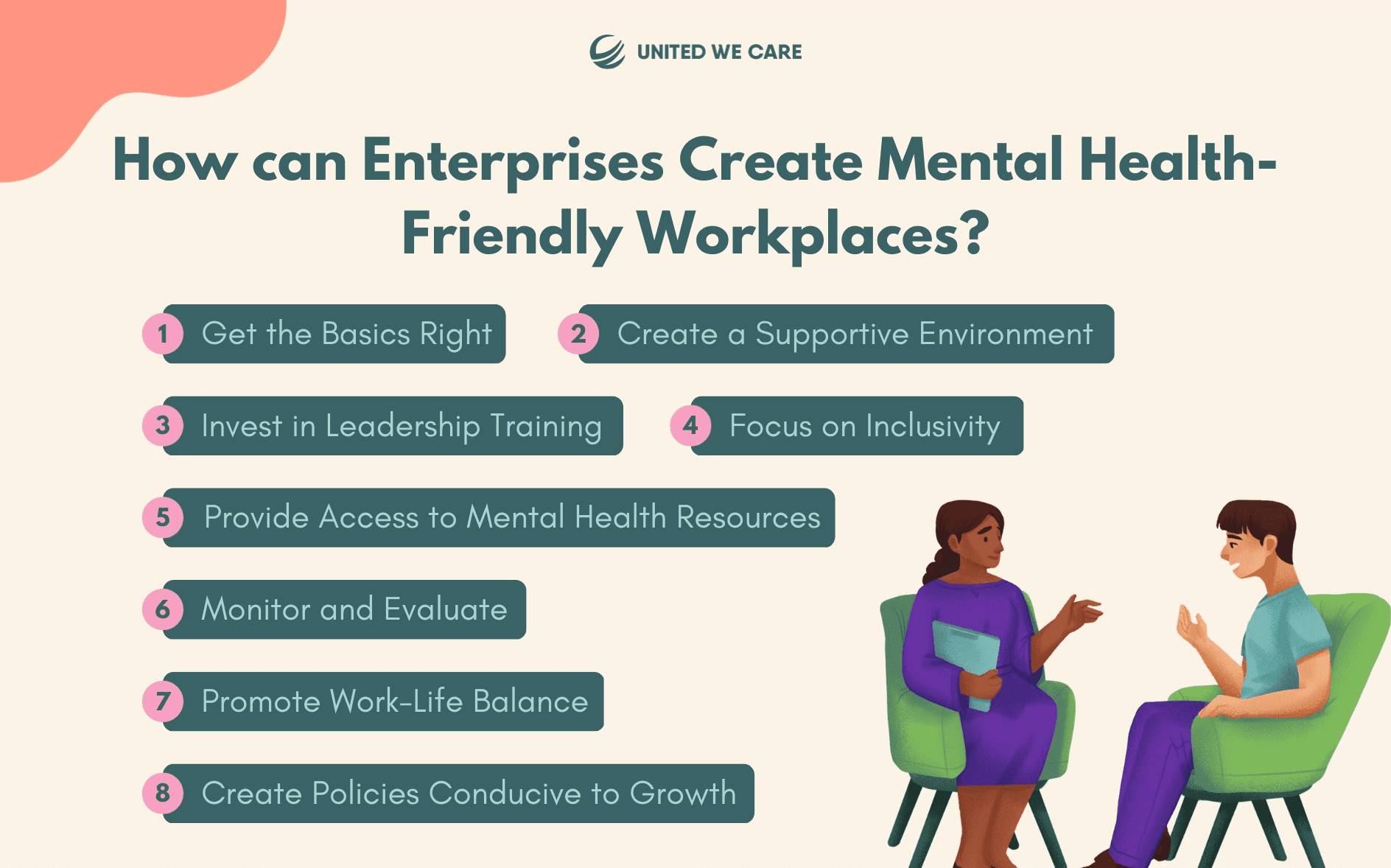Introduction
The world recently experienced something called the “great resignation, where people across the world left their jobs. Many gave the reason that poor work environments harmed their mental health. With more and more millennials and Gen Zs entering the work field, there is a strong rejection of places which are not mental health friendly. New trends like “quite quitting” have entered the vocabulary of employees who are prioritising their mental health. So, for companies without a focus on mental health, this means loss of talent, absenteeism, presenteeism, loss of productivity, and high turnover. This article sheds light on how companies can avoid this by creating mental health friendly workplaces.
What is a Mental Health Friendly Workplace?
A workplace where the mental health of employees and their well-being is a priority is a culture that is likely to succeed in today’s world. According to one survey, about 1 in 4 people had quit their jobs due to mental health concerns [1]. In another survey, Deloitte found that 46% of GenZ employees and 39% of millennial employees felt constantly worried and stressed at work [2]. In other words, for corporations across the world, mental health is becoming the key factor that influences productivity.
A mental health friendly workplace acknowledges the impact mental health has on productivity. The company culture also inherently believes it to be their ethical duty to provide a healthy work environment and to care for employee well-being. The culture promotes empathy, focuses on strong relationships, supports employees, is inclusive and values both equality and equity.
Why is a Mental Health-Friendly Workplace Important?
A workplace can have serious impacts on an employee. While a good workplace can incite a sense of achievement, purpose and satisfaction, a bad one can make it difficult to live one’s life. Even the WHO has recognised the impact workplace can have on mental health. According to its estimate, the global losses in terms of productivity due to mental health issues like depression and anxiety are roughly $ 1 Trillion [3].
When employees struggle with poor mental health, their productivity reduces. Two major measures which show reduced productivity are the increase in absenteeism and presenteeism. Employees tend to take more leaves and vacations when they have poor mental health. They are also less productive when they are present [4]. When mental health issues are there because of a toxic work culture, there is more burnout in employees, along with a higher intention to leave.
When employees work in a space which is committed to supporting them, their willingness to work is high. Further, the employees are able to grow intellectually, emotionally, and socially. In other words, their own skills and resources develop. When taken together, these factors of highly producing employee who grows and becomes better are invaluable resources for an organisation.
How can Enterprises Create Mental Health-Friendly Workplaces?

There are a number of things that organisations can do to create a mental health friendly workplace. Some important strategies are [3] [5] [6]:
- Get the Basics Right: Some factors are called the hygiene factors in the workplace. These include adequate benefits, safe physical and social conditions, comfortable working conditions and fulfilment of the basic needs of the employees. If workplaces compromise on any of these factors, the chances of employees being dissatisfied and later feeling anger, stress, anxiety, and burnout are high.
- Create a Supportive Environment: It is also important that there is trust and harmony between workers and managers as well as co-workers. The organisation can spend time on building psychological safety where employees share what they are feeling without fear of being judged or penalised. Further, a culture where employees can seek support from others when they are facing mental health issues can provide social support and help in healing.
- Invest in Leadership Training: While many managers wish to be supportive, they often do not have the appropriate skills to coach, mentor, and communicate with the top and bottom tier. Especially when employees share problems related to mental health, managers are often not clear on how to respond. It is important that organisations invest in leadership training for managers of all levels. This training must focus on how to support employees when they struggle with mental health issues.
- Focus on Inclusivity: Providing inclusive and equitable workplaces is a cornerstone of a psychologically healthy organisation. Organisations must ensure that their setups are inclusive to diverse populations like members of the LGBTQ+ community, employees of different races, castes, employees with disabilities, and people who are neurodiverse.
- Provide Access to Mental Health Resources: Awareness and access to mental health resources can have dual functions. They not only destigmatise mental health issues but also guide employees on what to do when they face concerns. This can help in early intervention and support. Some examples of resources are: such as counselling services, self-help guides, workshops on mental health, training on self-care, employee assistance programs, etc.
- Promote Work-Life Balance: While work and productivity are important, balance in life is important as well. Many companies indulge in an urgency culture that leads to employee overload and them working after hours. Companies should ensure that work is well-prioritized, roles and expectations are clear, and no one employee is overloaded with work. Employees can also be encouraged to take up vacation days to rest and recuperate.
- Create Policies Conducive to Growth: Companies must revise their policies and procedures to make them more flexible and accommodating of the different needs of employees. When employees have control and flexibility, their well-being increases. Companies can also ensure that their policies are conducive to employee development growth and have their mental health at the center.
- Monitor and Evaluate: It is not enough to assume that the processes and accommodations that the company has made are working. The organisation must continually monitor and evaluate qualitatively and quantitatively the employee attitudes, satisfaction, health, and mental health. This will give insights into what is not working and what steps the company can take to ensure the well-being of their employees.
Conclusion
The world is dealing with a mental health epidemic. Depression, anxiety, stress, burnout and other issues are on the rise. Factors like COVID-19 and sociopolitical upheaval are added stressors. Further, employees are struggling with rising prices and cost of living. In such situations, workplaces can become either a saving grace or another factor that creates stress and burnout. The companies that are mental health friendly are likely to face more growth, productivity and stability. Simple strategies can help in creating the workplace as a source of help and growth for people.
If you are an organisation that wishes to improve employee productivity and create a mental health friendly workplace, you can contact us at United We Care. We provide a range of services, including EAPs and workshops for supporting employees and enterprises.
References
- K. Mason, “Survey: 28% have quit a job because of their mental health,” JobSage, https://www.jobsage.com/blog/survey-do-companies-support-mental-health/ (accessed Sep. 29, 2023).
- “The Deloitte Global 2023 gen Z and millennial survey,” Deloitte, https://www.deloitthttps://hrcak.srce.hr/file/201283 e.com/global/en/issues/work/content/genzmillennialsurvey.html (accessed Sep. 29, 2023).
- “Mental health at work,” World Health Organization, https://www.who.int/news-room/fact-sheets/detail/mental-health-at-work (accessed Sep. 29, 2023)
- M. Bubonya, “Mental health and productivity at work: Does what you do matter?,” SSRN Electronic Journal, 2016. doi:10.2139/ssrn.2766100
- I. Grabovac and J. Mustajbegović, “Healthy Occupational Culture for a worker-friendly workplace / kultura zdravih organizacija – radna mjesta prijatelji radnika,” Archives of Industrial Hygiene and Toxicology, vol. 66, no. 1, pp. 1–8, 2015. doi:10.1515/aiht-2015-66-2558
- “5 ways to improve employee mental health,” American Psychological Association, https://www.apa.org/topics/healthy-workplaces/improve-employee-mental-health (accessed Oct. 1, 2023).









